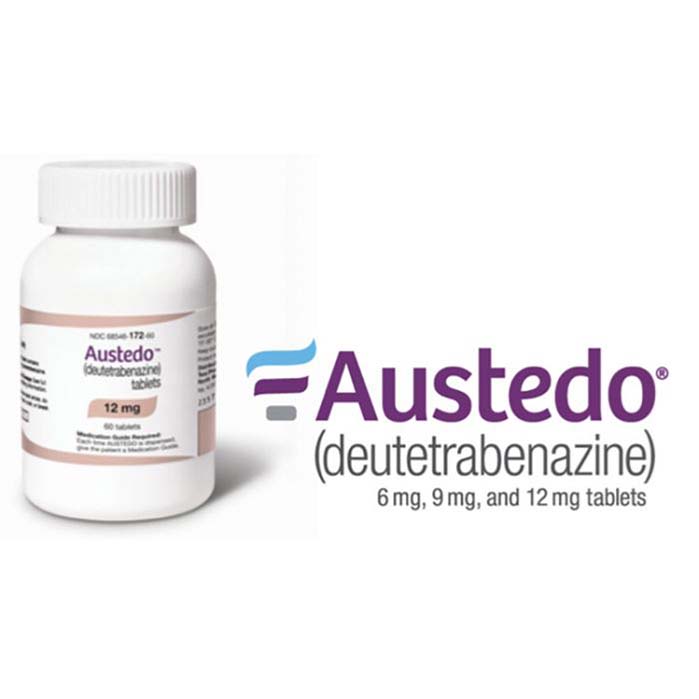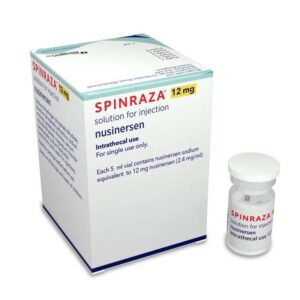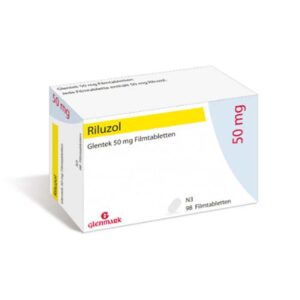Buy Austedo (deutetrabenazine) Online For Sale
From $5,330.00
DISEASE INDICATIONS: Huntington’s Disease, Tardive Dyskenia
MANUFACTURER: Teva Pharmaceuticals
USAGE: Oral
MEDICINE APPROVED BY:
Food and Drug Administration (FDA)
Austedo (deutetrabenazine) is a medication that is used to treat chorea, a condition characterized by excessive and involuntary movements, in patients with Huntington’s disease and tardive dyskinesia.
Description
What is Austedo (deutetrabenazine) for?
Austedo (deutetrabenazine) is a medication used to treat involuntary movements (also known as chorea) associated with Huntington’s disease. Huntington’s disease is a hereditary condition that causes progressive damage to nerve cells in the brain, leading to involuntary movements, emotional problems, and cognitive decline.
Austedo works by regulating levels of dopamine in the brain, a chemical that plays a role in movement control. By regulating dopamine levels, Austedo helps to reduce chorea and other involuntary movements associated with Huntington’s disease. Austedo is available as an oral tablet, and the dosage is typically adjusted by a healthcare provider based on the individual’s needs and response to treatment.
It is important to note that Austedo is not a cure for Huntington’s disease, and it does not slow down the progression of the disease. It is only used to manage the symptoms associated with the condition. Austedo is usually prescribed as part of a comprehensive treatment plan that may also include physical therapy, occupational therapy, and speech therapy. It is important to talk to a healthcare provider about the potential risks and benefits of Austedo before starting treatment.
How does Austedo (deutetrabenazine) work?
Austedo (deutetrabenazine) works by regulating levels of dopamine in the brain. Dopamine is a neurotransmitter that plays a key role in movement control, among other functions. In people with Huntington’s disease, there is an imbalance of dopamine in the brain, which can lead to the involuntary movements known as chorea.
Austedo contains an active ingredient called deutetrabenazine, which is a form of tetrabenazine. Tetrabenazine is a medication that reduces the amount of dopamine released by nerve cells. However, unlike tetrabenazine, deutetrabenazine is deuterated. This means that it contains a small amount of heavy hydrogen, which helps the body to process the medication more slowly and reduce the risk of side effects.
Deutetrabenazine works by inhibiting the activity of a transport protein called vesicular monoamine transporter 2 (VMAT2) that is responsible for packaging dopamine and other neurotransmitters into vesicles, or small sacs, inside nerve cells. By blocking VMAT2, deutetrabenazine reduces the amount of dopamine that is released into the synapse, the tiny gap between nerve cells, thereby reducing the severity of chorea and other involuntary movements associated with Huntington’s disease.
It is important to note that Austedo does not cure Huntington’s disease, and it does not slow down the progression of the disease. It is only used to manage the symptoms associated with the condition. The dosage of Austedo is usually adjusted by a healthcare provider based on the individual’s needs and response to treatment. It is important to talk to a healthcare provider about the potential risks and benefits of Austedo before starting treatment.
How is Austedo (deutetrabenazine) taken?
Austedo (deutetrabenazine) is taken orally as a tablet. The starting dose of Austedo may vary depending on the individual’s weight, medical history, and other factors. In general, the dose is gradually increased over several weeks to reach the target dose recommended by the healthcare provider.
Austedo tablets should be swallowed whole with water and may be taken with or without food. The tablets should not be chewed, crushed, or broken. The dosage of Austedo is typically adjusted based on the individual’s response to treatment and any side effects they may experience.
It is important to follow the dosing instructions provided by the healthcare provider and not to change the dose or stop taking Austedo without first consulting with them. Abruptly stopping Austedo can worsen symptoms or trigger withdrawal symptoms.
If a dose of Austedo is missed, it should be taken as soon as possible. However, if it is close to the next scheduled dose, the missed dose should be skipped and the regular dosing schedule should be resumed.
It is important to take Austedo as prescribed and to talk with a healthcare provider if there are any concerns or questions about the medication.
Patients who are not switching from tetrabenazine
For patients who are not switching from tetrabenazine, the starting dose of Austedo (deutetrabenazine) will depend on the individual’s medical history, current condition, and other factors. The recommended starting dose for patients with Huntington’s disease is typically 6mg per day, divided into two daily doses of 3mg each. The dose may be gradually increased by 6mg each week until the target dose is reached or until the maximum recommended daily dose of 48mg is reached.
Patients with tardive dyskinesia may have a different recommended starting dose. In general, the healthcare provider may start at a lower dose and gradually increase the dose based on the patient’s symptoms and response to treatment.
Austedo tablets should be swallowed whole with water and may be taken with or without food. The tablets should not be chewed, crushed, or broken. It is important to take Austedo as prescribed and to talk with the healthcare provider if there are any concerns or questions about the medication.
As with any medication, patients should not change the dose or stop taking Austedo without first consulting with their healthcare provider. Abruptly stopping Austedo or any other medication can worsen symptoms or trigger withdrawal symptoms.
Patients who are switching from tetrabenazine
For patients who are switching from tetrabenazine to Austedo (deutetrabenazine), the starting dose of Austedo is usually based on the patient’s current tetrabenazine dose. The healthcare provider may start with a lower dose of Austedo and gradually increase the dose depending on the patient’s symptoms and response to treatment.
The recommended starting dose of Austedo for patients switching from tetrabenazine is typically 6mg per day, divided into two daily doses of 3mg each. The dose is usually increased by 6mg each week until the target dose is reached or until the maximum recommended daily dose of 48mg is reached.
It is important to follow the dosing instructions provided by the healthcare provider and not to change the dose or stop taking Austedo without first consulting with them. Abruptly stopping Austedo or any other medication can worsen symptoms or trigger withdrawal symptoms.
During the transition from tetrabenazine to Austedo, the healthcare provider may monitor the patient’s symptoms closely and adjust the dose as needed. It is important to report any new or worsening symptoms during the transition period.
Patients who are switching from tetrabenazine to Austedo should also be monitored for potential drug interactions or side effects. The healthcare provider may adjust the dose of other medications or monitor for any changes in blood pressure, or heart rate.
Are there any known adverse reactions or side effects of Austedo (deutetrabenazine)?
Yes, there are possible adverse reactions and side effects associated with Austedo (deutetrabenazine) use. Some of the common side effects reported by patients include:
– Sleepiness or drowsiness
– Dry mouth
– Diarrhea
– Nausea
– Fatigue
– Weight gain
– Insomnia
– Restlessness or agitation
– Anxiety or depression
Other less common but more serious side effects that can occur with Austedo use include:
– Irregular heartbeats
– Neuroleptic malignant syndrome (NMS)
– Parkinsonism
– Akathisia
– Potentially irreversible tardive dyskinesia
– Suicidal thoughts or behaviors
It is important to report any new or worsening symptoms to your healthcare provider immediately. Your healthcare provider may adjust the dose or switch to a different medication based on your symptoms.
The risk of side effects may be increased if Austedo is used with other medications that affect the central nervous system or with other medications that may prolong the QT interval, a measure of the electrical activity of the heart. It is important to discuss all the medications you are taking with your healthcare provider before starting Austedo.
As with any medication, the benefits and risks of Austedo should be weighed carefully, and it should only be used as directed by a healthcare provider.
Additional information
| Package | 60 tablets of 6 mg, 60 tablets of 9 mg, 60 tablets of 12 mg |
|---|





Reviews
There are no reviews yet.